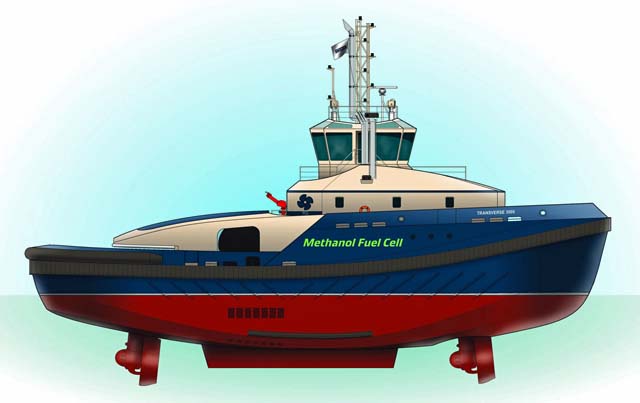Towage provider Svitzer, part of A.P. Moller-Maersk, and naval architecture company Robert Allan Ltd (RAL) are launching the second phase of a project to design the world’s first methanol hybrid fuel cell (MHFC) tug.
Svitzer has conducted technical studies to establish the feasibility of this type of vessel accommodating the real-world operational requirements of a tug. Work will now begin between Svitzer and RAL to design the world’s first MHFC tug. This phase will include work to complete the vessel design, scope considerations for vessel construction, and onboard equipment selection necessary to build the vessel.
The MHFC tug will use an electrical propulsion system with methanol fuel cells and batteries delivering a self-sustained tug with longer endurance and fewer operational constraints than a purely battery-powered vessel. Secondary methanol fuelled generators will provide backup power if required without the need for a secondary fuel. Calculations indicate that the MHFC tug running on green methanol would prevent about 1,300t of CO2 annually from being emitted into the atmosphere, compared to fossil-fuel-based vessels of the same dimensions within Svitzer’s global fleet.
The design of the MHFC tug will be a joint project between Svitzer and RAL using Svitzer’s TRAnsverse tug design as the platform. Svitzer will look to forge partnerships with other companies to finalise the selection of onboard equipment, such as the batteries and fuel cell system, and to support construction once the design phase is complete.
Gareth Prowse, Svitzer Head of Decarbonisation, said: “We’re excited to enter the next phase of delivering the world’s first methanol hybrid fuel cell tug. This project is a major milestone in Svitzer’s commitment to the decarbonisation of our global fleet and demonstrates our ability to harness new technologies and alternative fuels to deliver innovations that will have a significant, positive impact on shipping’s road to net zero. The combination of fuel cell technology and green methanol will result in improved operational efficiencies, resulting in less fuel consumption and lower emissions. We’re delighted to be collaborating with Robert Allan Ltd to design the MHFC tug and look forward to bringing on new partners to construct the vessel which will operate at the Port of Gothenburg in Sweden.”
The MHFC is expected to enter operations in the second half of 2025 at the Port of Gothenburg in Sweden, where methanol is the low-carbon alternative fuel of choice.
Göran Eriksson, Port of Gothenburg CEO, said: “The Port of Gothenburg has set ambitious targets to reduce shipping emissions within the port area by 70% by 2030. To deliver on that ambition, the transition of shipping lines from fossil fuels to more sustainable fuels such as green methanol is critically important. Svitzer’s decision to design and construct the world’s first methanol hybrid fuel cell tug is a major milestone which sets the example for the long-term decarbonisation of global towage services. We’re excited to welcome this pioneering new vessel to the Port of Gothenburg when it enters into operation in 2025.”
Mathias Jonasson, Svitzer MD Scandinavia and Germany, said: “Svitzer has been delivering safe and efficient towage services to customers in the Port of Gothenburg for decades. In addition to its ambitious emission reduction targets, the Port of Gothenburg has already gathered valuable experiences regarding the safe and convenient bunkering of methanol. The port’s experience and position as an emerging methanol bunker hub, combined with our long-standing collaboration and relationship, makes the Port of Gothenburg an obvious location for us to deploy the world’s first methanol hybrid fuel cell tug.”
Jim Hyslop, RAL Director Project Development Principal said: “Robert Allan Ltd is excited to be working with Svitzer to develop the world’s first Methanol Hybrid Fuel Cell Tug. Based on the award-winning TRAnsverse design, the innovative propulsion system on this new tug will enable operation completely free of fossil fuels. This is a major step forward in the path to decarbonising the tug industry, and we are extremely proud to be at the forefront of developments in these new technologies.”



